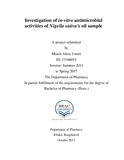Investigation of in-vitro antimicrobial activities of nigella sativa's oil sample

View/
Date
2017-11-05Publisher
BRAC UniversityAuthor
Ummi, Mairin AfrozMetadata
Show full item recordAbstract
Medicinal plants and its miracle healing property surprised the world from the beginning of medical science and pharmaceutical science. Before the dramatic change and invention of modern medicine and synthetic drugs people were completely depending on medicinal plants, still, 80% population of the world somehow depend on the medicinal plant. Among the medicinal plants, Nigella sativa is one of the most popular and diversely used plants. Nigella sativa seed's oil and extract have a long history of folklore usages in the various systems of medicines like Unani, Ayurveda etc. In this project, based on Nigella sativa seed’s popularity and acceptance among general people and recent rising threat of antimicrobial drug resistance, I select a market preparation of its seeds oil to screen its anti-microbial property by using popular disk diffusion and Agar dilution methods. Three gram-positive bacteria’s named Staphylococcus aureus, Staphylococcus pyogenes, Bacillus subtilis and five gram-negative bacteria’s named Vibrio cholera, E. coli, Shigella flexneri, Proteus vulgaris and Salmonella typhi were used for the screening. The antimicrobial activity was tested over four different concentration of oil sample on Disk diffusion method and three different concentration on Ager dilution method. I observed strong antimicrobial property against Bacillus subtilis, E. coli, Proteus vulgaris, Vibrio cholera and Salmonella typhi on Disk diffusion method and did not show any activity against Shigella flexneri, Staphylococcus pyogenes and Staphylococcus aureus. On Ager dilution method, a strong inhibition was observed against the growth Salmonella typhi by the higher concentration of oil and the Moderate inhibition was observed against the growth of Vibrio cholera by all the concentrations of oil samples. Moderate inhibition of the growth of E. coli also witnessed by the highest concentration of oil and minimum inhibition was showed by rest of the samples. Minimum inhibition of growth of Bacillus subtilis also showed over all the concentrations of oil samples. Hence Proteus vulgaris, Shigella flexneri, Staphylococcus pyogenes and Staphylococcus aureus did not show any inhibition activity. Therefore, this result represents a positive response against the biggest challenge and threat of antimicrobial drug resistance and furthermore intensive and molecular study needed to achieve the success.
